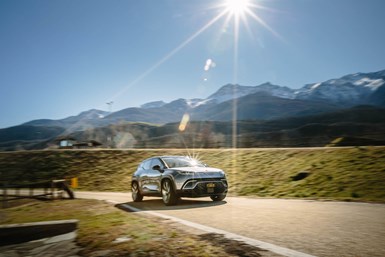Simon Sproule Has Forgotten More About Auto Than Many Experts Know
With a CV like his, there is a depth of knowledge not readily matched.
#marketing
Consider this resume:
- Ford Motor Company (UK/US), communications manager
- Jaguar Land Rover, vice president, Communications, North America
- Nissan North America, vice president, Communications
- Microsoft, corporate vice president, Corporate Communications
- Nissan Motor Corporation, corporate vice president, Global Communications
- Tesla Motors, vice president, Marketing and Communications
- Aston Martin Lagonda, chief marketing officer and vice president
- Fiat Chrysler Automobiles, chief communications officer
- Toptal, vice president, Communications
- Fisker Inc., advisor
Simon Sproule has had all of those positions in his nearly 30 years in the auto industry. He’s been in London and Dearborn, Paris and Tokyo, Gaydon and Auburn Hills, and more.
He’s worked with amazing engineers like Richard Parry-Jones. Executives like Carlos Ghosn. Designers like Henrik Fisker.

The Fisker Ocean: Not only a new EV, but the result of a new business model. (Image: Fisker)
And Sproule is one of the most affable people you’ll ever meet.
Because you’re unlikely to find anyone with a greater breadth of experience in the auto industry, we figured that he would be a great (return) guest on “Autoline After Hours.”
So on this edition of the show “Autoline’s” John McElroy, Joe White of Reuters, and I spend the entire hour talking to Sproule about the industry.
One of the interesting things that Sproule points out in our discussion of how there seems to be a burgeoning number of vehicle startups—predicated on the comparative simplicity of building an EV compared to a vehicle with an ICE (assuming, of course, that the company in question is actually building the powertrain and not just dropping it in)—is that “brand matters.”
Think of almost any product you use in your daily life, and if it matters to you, then it probably has a brand attached to it.
A Different Model
Another thing Sproule talks about is that there is, in some cases, an entirely new approach to the industry, characterized by what Fisker is doing.
That company plans to have an “asset-light” business model. That is, the company will provide the design, engineering, interfaces, etc., but it won’t manufacture the cars. That will be done by a supplier.
In addition, rather than the company will provide a leasing arrangement with customers such that the vehicles will go back to Fisker, then be modified or refurbished as required, then put back on the market as used but, in effect, “from the factory,” which Sproule points out helps manage the vehicle over its lifetime.
Other topics we discuss include the changes at Nikola, the changes being made at the top of Ford by new CEO Jim Farley, the likely state of the industry in Q4, and a whole lot more, which you can watch on "Autoline After Hours."
RELATED CONTENT
-
Microsoft Tightens the Web with its .NET Initiative
Last summer, Microsoft announced Microsoft .NET. Marketing hyperbole aside, this initiative is planned to dramatically change the way your computer and computer applications operate. It also could have a profound effect on your business.
-
Ford’s U.S. Marketing Director Quits
Chantel Lenard, executive director of U.S. marketing at Ford Motor Co., has quit after 25 years with the carmaker.
-
Navigation Comes to Pocket Bikes
According to the National Highway Traffic Safety Administration, “NHTSA does not define the terms ‘motor scooter,’ ‘moped,’ ‘pocket bike,’ ‘mini-chopper,’ ‘mini-ninja,’ or any other terms of this nature that may be used for the purpose of marketing motorcycles and motor driven cycles.


.jpg;width=70;height=70;mode=crop)